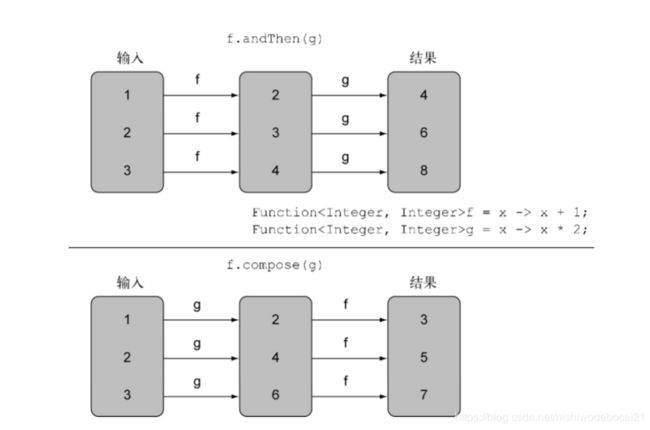andThen和compose区别(Java)?
在辨别andThen和compose区别之前我们先来看一段简单的代码
class FunctionTest {
public static void main(String[] args) {
Function<Integer, Integer> f = x -> x + 1;
Function<Integer, Integer> g = x -> x * 2;
Function<Integer, Integer> h = f.compose(g); // f(g(x))
Function<Integer, Integer> m = f.andThen(g); // g(f(x))
int result = h.apply(1); // 3
int result1 = m.apply(1); // 4
System.out.println(result);
System.out.println(result1);
}
}
运行结果为:
3
4
通过结果,我们可以大概的猜测到andThen和compose的细微区别了。通过字面的意思来理解,andThen是“ 然后 ”的意思,a.andThen(b)的意思就是a先执行然后b开始执行。同样的compose由" 构成 "的意思,那么a.compose(b) 的意思就是b先执行,然后a开始执行。事实上,它们的运行原理就是这样子的,下面我用一张图来演示一下其中的运作流程。

那么问题来了,什么时候我们用andThen,什么时候用compose呢。虽然a.and then (b)与b. composition (a)等价,但是在使用上还是有一个实际的区别,那就是当这两个函数中只存在一个函数的时候。
假设你有一个已经存在的函数
Function<Integer,String> iToHex = i->"'"+Integer.toHexString(i)+"'";
然后,你想要链式字符串转换,例如。
Function<Integer,String> itoUpperHex = iToHex.andThen(String::toUpperCase);
那么很明显,andThen相对compose来说,肯定要便捷不少,如果你要用compose来实现的话,那么你肯定会这么去实现
Function<Integer,String> itoUpperHex
= ((Function<String,String>)String::toUpperCase).compose(iToHex);
但是相反的话,如果你已经有一个这样的函数的话
UnaryOperator<String> quote=s -> "'"+s+"'";
这个时候,如果你想创建一个带引号的十六进制函数,用compose的话就相当方便
Function<Integer,String> iToHex = quote.compose(Integer::toHexString);
但是你用andThen来实现的话,那么会是这样子的
Function<Integer,String> iToHex
= ((Function<Integer,String>)Integer::toHexString).andThen(quote);
所以该用哪种方法取决于已经存在的函数。如果这两个函数都存在的话,那么使用哪个方法都没有关系(除非你怀疑其中一个函数可能已经覆盖了这些方法)。如果没有现有函数作为参考的话,哪个好哪个话就说不准了。